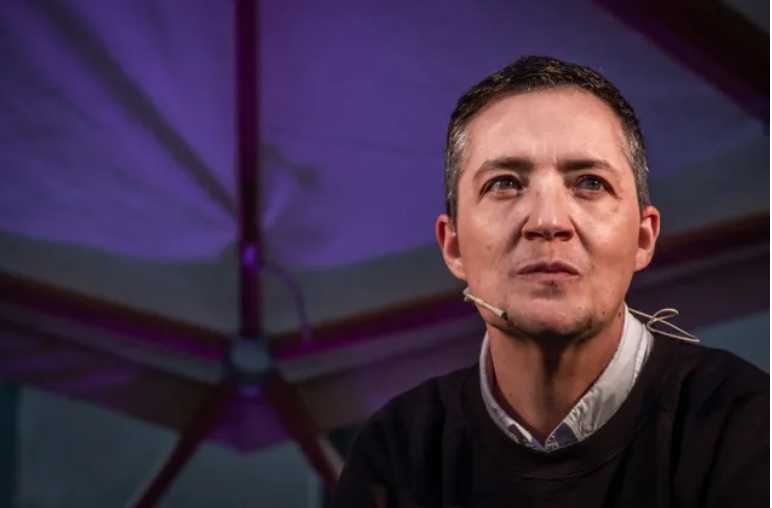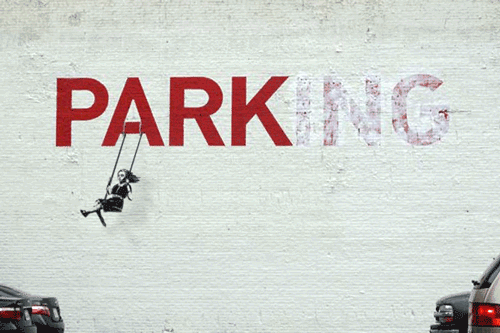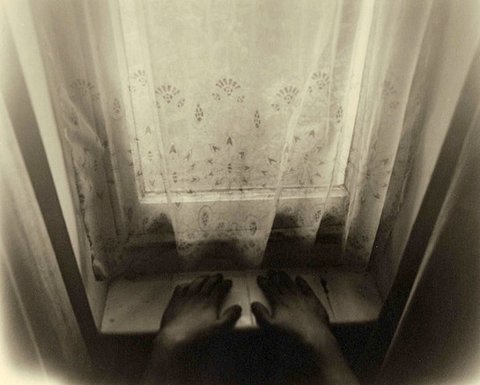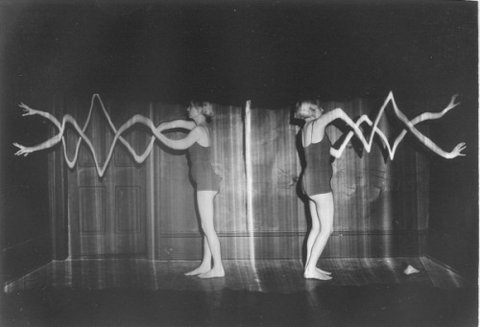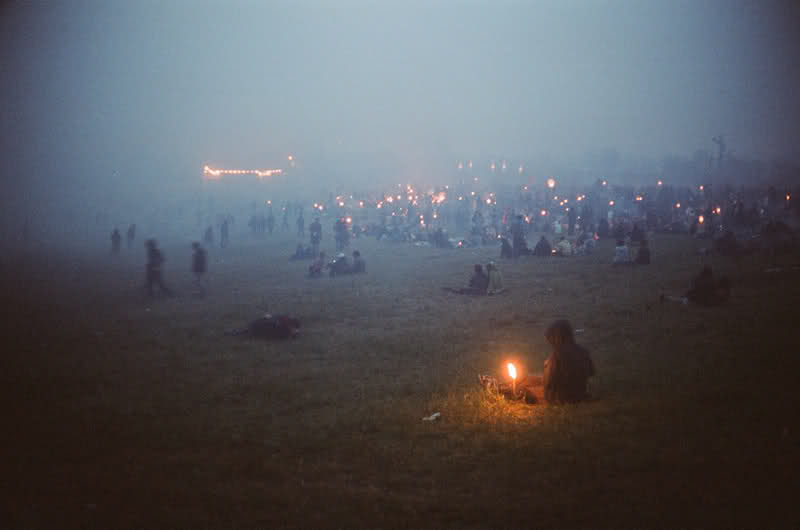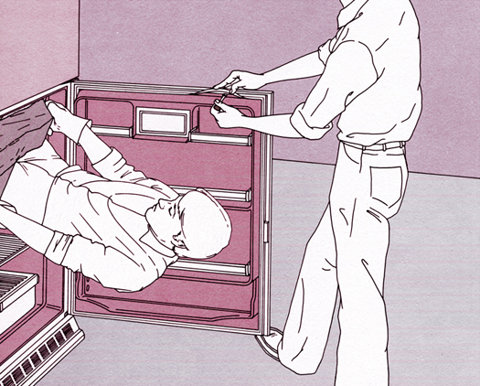Notes from a talk at Glad Day Bookshop, Toronto, January 22, 2020, launching An Apartment on Uranus.
Let’s trace a genealogy of resistance to “the norm.” Thank you Kathy Acker, Lydia Lunch, Audre Lord. The misfits, the ones who can’t make themselves fit in. What follows are the necessary inventions.
Art is an undefined territory. Because our parliaments don’t represent us, museums could become the sites for new parliaments that we will organize ourselves. We have the right to claim other parliaments. New institutions with new rituals and languages.
We’re looking for different kinds of representation to find a different way of loving, to have different kinds of relationships.
I would rather have freedom than goodness.
In modernity, psychoanalysts took possession of our dreams. The dreamwork is framed inside family, normalized sexuality and frustration. How to restart an interpretation of dreams not based on psychoanalysis?
Before there was “homosexual” there was “non-conforming sexual beings.” Karl Ulrichs “the first theorist of homosexuality.”
The term “homosexual” led to legalization, a surrender to the courts, to administration and bureaucracy, the fight for gay marriage (“official recognition”) and medicalization.
By insisting on defining and redefining ourselves, we have produced a lot of identities. But have we produced more freedom?
Identity politics began with second wave feminism. What is the aim of feminism? Perhaps: the liberation of women. But what is a woman?
We’ve been reinforcing the same techniques of control that we have been critiquing. Can we invent something else? How to find a mode of action that is not based on identity politics? What about: somatic communism – political theory founded in a vulnerable mortal body. A subject that is not subjected. A subject that is collectively defined. Our challenge is to invent a new framework. We might be able to do it before we can talk about it.
For example during the AIDS crisis people took care of each other, there were self-organized “care teams.” People could fight against systems of control without having to define yourself as this or that. You are dying and need to create a structure of care. No one says: I am trans, so the only people who can look after me must be trans.
Who is the subject of political fights? Is feminism about women? Or is feminism about the collective struggle of transformation to critique gender binaries and social power? If you’re not trans, can you be part of trans groups?
The revolutionary oppositional force that we as subaltern sexual beings have been fighting for since the late eighteenth century (retagged “gay liberation”) has now boiled down to marriage rights and adoption. The energy of revolutionary forces have become marriage, family and kids which I have opposed all of my life. Even when I was four years old, I saw the people around me acting as if in a masquerade their roles of “father” and “mother.”
Not since the fifteenth century with the advent of the printing press (the transition from oral to literary culture) and a devastating European colonization, have we faced such a deep epistemic crisis of transition. We are in a revolutionary moment. We’re in a moment of total transformation, and we are clueless. We know very little.
What have we done as humans? Reproduced necropolitics, a politics of death.
I’m Not Me
Nathan Dunne: I would stare at my hands and think, ’I’m not me.’ No matter where I was, in the middle of a busy street or at my dining table at home, the condition would be the same. It was like looking at my hands through a plate of glass. Although I could feel the skin on my palms, it did not feel like my own. Half of myself would move through the day while the other half watched. I was split in two.
RD Laing: The complaint he made all along was that he could not become a ‘person.’ He has ‘no self.’ ‘I am only a response to other people, I have no identity of my own.’ He felt he was becoming more and more ‘a mythical person.’ He felt he had no weight, no substance of his own. ‘I am only a cork floating on the ocean.’
I’m not convinced I have a body.
Non-conforming bodies, disabled, racialized, women’s bodies – they do not exist. We have no legal existence. We’re in a paradoxical position. We are objects of techniques of control and examination, but the living body is not fully captured by these techniques.
We are in the waiting room of the world and it is expanding (for migrants, for people between identities). We are waiting. You exist but you don’t have a political existence. This is granted through political prosthetics: the passport.
Wikipedia: Gloria E. Anzaldua (26 September 1942–15 May 2004) was an American scholar of Chicana cultural theory, feminist theory, and queer theory. She loosely based her best-known book Borderlands/La Frontera: The New Mestiza on her life growing up on the Mexico–Texas border and incorporated her lifelong experiences of social and cultural marginalization into her work. She also developed theories about the marginal, in-between, and mixed cultures that develop along borders.
Our only children are machines. This is all we will leave behind. Machines have more presence than any bodies that are here today.
Robots will soon have legal status to drive cars, and no doubt, to become citizens, even while so many bodies lack legal status. That’s what we have to fight for. How will we redefine the limits of what is a human being?
Forget about universalisms – like universal rights. Universal is always code for white, male European. When you look at migration, at the experience of Indigenous peoples, those crossings are different, each is specific, the learning is unique. Migration practices are very old and sophisticated. The bodies that undertake these crossings lie beyond any epistemic framework, the body continues to live even without legal status or recognition.
Singularity vs Universalism. How about recognizing the singularity of each single body? The reality is not female or male, homo or hetero. We are constantly changing. How to remain true to this changing?
Claiming that people are born male or female is like stating the earth is flat. The sexual binary doesn’t exist. From the point of view of science, one in every 200 is born intersex. And doctors in France no longer want to intervene, they’ve been sued, they don’t want to operate any longer. There is already a recognition that our epistemic regime is no longer accurate, so it must change. In 20-100 years we will flip to a new epistemology of the body.
In the fifteenth century, nothing beyond Europe existed for Europeans. In relation to the living body we’re in the same situation. Only a few bodies exist (white, male, heterosexual). The rest are reservoirs of labour.
Capitalism needs bodies as a labour force, to extract labour from us. But disabled, racialized, trans bodies do not exist legally today. My body, for instance, is not mapped by contemporary anatomy textbooks
We need to move from identity politics to the somatic body as a political subject. The affirmation of the body (as new centre of political struggle), as a living force that cannot be fully donated to identity production or race production. Identity is an enclosure.
Where are the radical experimental critiques of western capitalist techniques being done?
In a post-identity space, how to stop from re-centering white experience?
A name has to be given to you.
We’ve never been queer. We’ve been marked and defined by the norm. Maybe we don’t have bodies yet. We still have to fight to become what we have not been. Beyond queer, trans, the identities that we know. The struggle is to move outside “the human. “Humanity” as the only species that has rights is the cause of our current crisis. We need a new taxonomy, new ways of living and actual bodies. Our bodies are constantly challenging the fallacy of identity because identity is constantly changing.
I’m more interested in practices than concepts. The practice is crossing. The crossing will impact your identity, the practices of resistance and transition.
An Apartment on Uranus by Paul B. Preciado (Semiotexte, 2020)
summary quotes from this genius volume
Division
I was several. I bring you a piece of the horizon.
The violence generated by the West’s dualism. The universe cut in half, everything is either man or woman, colonizer or colonized. We have been divided by the norm. Emotional spaces, work and social spaces are divided in terms of male or female, hetero or homo – along with race, the most violent of political borders invented by humanity.
What we call subjectivity is only the scar that, over the multiplicity of all that we could have been, covers the wound of this fracture. It is over this scar that property, family and inheritance were founded. Names are written and sexual identities asserted.
To oppose the gender and sexual binary regime is the same as denying the incarnation of Christ in the Middle Ages.
Like gender, the nation does not exist outside of collective practices, which imagine and construct it.
Metaphor is the transport of a meaning from one place to another.
Intersection is the only place that exists. There are no opposite shores. We are always at the crossing of paths. And it is from this crossroads that I address you, like the monster who has learned the language of humans.
Spivak: strategic essentialism. Rosi Braidotti: nomadic subjectivity.
Heterosexuality is not just a politics of desire, it is a technology of government.
Living Machines
Masculinity is to society what the State is to the nation: the holder and legitimate user of violence. Socially this takes the form of domination, economically the form of privilege, sexually in the form of aggression and rape. Feminine sovereignty is linked to the capacity of women to give birth. Masculinity is defined necro-politically (by men’s right to put to death) while femininity is defined bio-politically (by women’s obligation to give life).
Dominant classes try to displace resentment by inciting dominated classes to fight amongst themselves. Howard Zinn showed that in North American territory during the 18 and 19th centuries, the colonial elite incited hatred between poor English, German and Irish whites who worked as servants versus the Indigenous peoples, non-white servants and slaves. The colonists invented systems of representation, promoted by science and popular culture (vaudeville, blackface) which showed that Native Americans and racialized bodies were inferior. Intoxicated by racism, white workers and servants transformed their rebellious energies into racial hatred, and helped white landowners ensure their rule, not just over future non-white workers, but also over themselves, the poor white workers.
Blacks were treated as objects and merchandise, living machines, mere forces of production and reproduction. Homosexuals were regarded as subhuman, unworthy of belonging to the community of humans, incapable of integrating into the social institutions of marriage and reproduction. Blacks and homosexuals had to be dominated, domesticated, locked up, used, consumed.
The first machines in the industrial revolution were not steam engines, printing presses or guillotines… but slave labour on the plantation, sexual and reproductive female workers, and animals. The first machines in the industrial revolution were living machines. So, humanism invented another body that it called human: a sovereign, white, heterosexual, healthy, seminal body. A body full of organs and capital, whose actions are timed and whose desires are the effects of a necropolitical technology of pleasure. Liberty, Equality, Brotherhood. The systems of slavery and then of wage labour, arrive as the foundation of liberty for the modern man, while competition and rivalry are the driving forces of fraternity.
Every society designates a South, a place where extraction will be organized and rubbish dumped. The South is the mine and the cesspool. Heart and anus. The South is also the place feared by the North as s reserve of revolutionary power.
Colonial modernity is inventing a geography and a chronology: the South is primitive and past. The North is progress and future. The South is the result of a racial and sexual system of social classification. The South is a sexualized, racialized myth. In Western epistemology, the South is an animal, feminine, infantile, a fag. The South is potentially sick, weak, stupid, incapable, lazy, poor. At the same time, the South is the place where capitalist extraction is taking place: the place where the North captures energy, meaning, enjoyment and added value. The South is the skin and the uterus. Oil and coffee. Meat and gold.
Exclusion is an ancestral necropolitical technique.
Schools
The child is a biopolitical artifact that guarantees the normalization of the adult. What my father and mother were protecting was not my rights as a child, but sexual and gender norms that had been painfully placed in them.
School is the first place to train in gender and sexual violence. School is a factory for little machos and queers, for the pretty and the fat, the bright and the slow. A place where conquerors and conquered don a signifier that ends up becoming a face. The only language spoken is that of the secret, mute violence of the norm. School is a disciplinary institution whose goal is the normalization of gender and sexuality. School encourages and rewards the conventional enactment of the codes of masculine sovereignty and feminine submission. At the same time, it surveys the body and its movements, punishes and pathologizes any form of dissidence. To its prime aim of fabricating national virility are added the tasks of shaping feminine sexuality, and marking racial, class, religious, functional or social difference. Schools are factories of heterosexuality.
All human animals procreate in a politically assisted way.
Marriage was the necessary patriarchal institution for a world without contraceptive pills or paternity tests: whatever the uterus produced was regarded as the property of the father. The child was part of a biopolitical project, population growth became the object of economic calculation as heterosexuality was enlisted for national reproduction.
Statistics as a technique of social representation began in 1760 with the application of math to the management of population in the works of Gottfried Achenwall and Bisset Hawkins. Political arithmetic and eugenics followed. England study in 2013: during 15 “honeymoon” months couples make love once a day. After 4 years the average goes down to once a week. After 15 years, 50% have sex four times per year, while the other half keep separate bedrooms.
The uterus is not a private organ, but a public space that is haggled over by religious and political powers, as well as by medical, pharmaceutical and agribusiness industries. Each woman with a uterus bears within her a laboratory of the nation-state, and it’s on the management of that lab that the purity of the national ethnic group depends.
Until the 18th century many working class women earned their living as wet-nurses. In 1752, Carl Linnaeus published a pamphlet that urged all women to breastfeed their own children so they could “avoid the contamination of races and classes.” From being a product that proletarian women could put on sale, milk became a precious biopolitical liquid through which racial and national identity flowed. Milk stopped belonging to women and belonged to the patriarchal State instead. A triple process was accomplished: devaluing women’s labour, privatizing bodily fluids, enclosing women in domestic space.
Love is not an emotion. It’s a kind of government technology of bodies, a politics to control desire, its goal is to capture the power to act and take pleasure from two living machines in order to put them at the service of social reproduction.
Neoliberal
At a time when the psychology of personal success presents itself as the ultimate Grail of neoliberalism in response to the sinister procession of political, economic and ecological violences.
Neoliberalism did not destroy nation-states, it established an alliance with the most conservative political segments in order to limit the access of the lower classes to the technologies of production of power and knowledge. A new political cycle began.
What National-Christian rhetoric advocates when they wave the flag of rupture and social rebellion cannot be called politics, but war. The militarization of social relations. As long ago in Spain, a new French National-Christian language is trying to invent a French nation that does not exist and that offers nothing but violence. A dramatization of a new theatrical sovereign masculinity.
The imperative of sexual difference as a condition of possibility for national identity.
The border is an immunological theatre in which each body is perceived as a potential enemy, and the two of us are placed on either side of this threshold to play the game of identity and difference. The border is a space wehre identity is destroyed or produced.
The social apparatus of identity production and its techniques (photographs, documents, declarations).
The new management of political subjectivity demands producing emotions of terror and panic through audiovisual and biochemical means.
How we love
The voice: the most prosthetic and fantastic of all the body’s organs.
I rarely wake up in the same bed, or the same body.
New feminists do not need a husband because we are not women. Just as we don’t need an ideology because we are not a people.
It is capital, not life, that is being reproduced. These categories are the map imposed by authority. But if these sexualities do not exist, then who are we? How do we love? Imagine it.
An anarcho-queer, anti-state, trans-feminist collective order. Ecosexual.
Sex
Sexuality is a political theatre.
The sexual life of a Western citizen consists of 90% discursive material (images or narratives) and (if they’re lucky) 10% actual events. A sexual revolution is always a transformation of the imagination, of the images and fantasies that mobilize desire… The changes in language, in represention and porn, have transformed our ways of desiring and loving.
Disability is not a natural condition, but is the effect of a social and political process of “disabilitation” or “decapacitation.” Biped, upright, mobile life is not a better life without the architecture that makes it possible. We don’t need better disability industries, but architectures without barriers. Antonio Centeno: “They threw us out of our own bodies; we have to reclaim them. Recovering them for pleasure is the most subversive, transformative thing we can do.”
Franco Berardi: we need to eroticize daily life, to displace desire captured by capital, and redistribute it.”
Baltasar Gracian: What’s the point of reason moving forward if the heart stays behind?
Paradigm shift
Fragility, and not courage, is what brings about revolution.
Here is one of the central techniques for producing political subjectivity that the Zapatistas teach us: to de-privatize proper nouns by borrowing names, and to undo the individualist fiction of the face by wearing the balaclava. The name is undone and collectivized. To question the stability of the name and the truth of the face as the ultimate referents of personal identity. Disidentification. The borrowed name and balaclava function as the drag wig, the mustache and high heels of trans culture: signs of a political-sexual transvestitism, but they are also the queer-Indigenous weapons allowing them to confront the neoliberal aesthetic.
Screens are the new skin of the world.
Soon we’ll stop printing the book and print on flesh. Digital biological writing. We’ll be able to make sexual organs with a 3D bio-printer. The era of Guetenberg was characterized by the de-sacralization of the Bible, the secularization of knowledge, the multiplication of politically dissident languages. Entering the 3D biological Gutenberg era, we will experience the desacralization of modern anatomy as a dominant language.
The paradigm of sexual difference that functioned in the West since the 18th century entered a crisis in the latter half of the 20th century with the development of chromosome analysis and genetic data. One child out of 2000 is born with genital organs regarded as neither masculine or feminine.
Statistics are stronger than love.
Cities are socio-architectural machines that can produce identity. In the 11thcentury the Santiago de Compostela pilgrimage constructed the Catholic individual, just as 17th century Amsterdam transformed the explorer into a bourgeois, 18th century Paris sculpted the free-thinker or the revolutionary, Buenos Aires created the colonial mind of the 19th century, while New York of the 1970s and post-wall Berlin produced the identity of the contemporary artist.
“My” testicles are a small bottle of 250mg of testosterone that travels in my backpack. The issue is not that “my” testicles are outside my body, but rather that “my” body is beyond “my” skin, in a place that cannot be thought of as simply mine. The body is not property but relationship. Identity (sexual, gender, national or racial) is not essential, but relational.
My testicles are a political organ that we have invented collectively and that allows us to produce an intentional form of social masculinity.
Science, technology and the market are redrawing the limits of what is now and what will be a living human body tomorrow. These limits are defined not just in relation to animality and forms of life that historically have been considered sub-human (proletarian, non-white, non-masculine, trans, crip, disabled, migrant…), but also in relation to the machine, to artificial intelligence. If the first industrial revolution was characterized, with the invention of the steam engine, by an acceleration of forms of production, the present tech revolution, marked by genetic manipulation, nanotechnology, the technologies of communication, logistics, pharmacology and artificial intelligence, impacts the processes of reproducing life. In the current industrial mutation, the body and sexuality occupy the place occupied by the factory in the nineteenth century.
The technologies of subjectity and of government that modernity has invented to legitimize the sexo-colonial supremacy of the West over the rest of the planet are today in crisis.
Male and female, hetero and homosexuality, are not natural laws, but contingent cultural practices. Languages of the body. Aesthetics of desire. Being able to draw and print out sexual organs will make us face new questions. What sex do we want to have? It would be possible to have a penis with a clitoris or neither, or a third arm in place of a penis, or an eroticized ear devoted to sexo-auditory pleasure. The time will come of erotics defined not by laws of sexual reproduction or political regulation but by the principles of complexity, singularity, intensity and affect.
Our most accessible, intimate external techno-organs: the mobile phone.
When we download an app, we don’t install it simply on our phone, but directly onto our cognitive apparatus. While Rene Scherer teaches us that pedagogical institutions developed during modernity have served to set the masturbating hand to writing and working, we now understand that the new digital disciplines set the assembly-line hand that used to write and work to masturbate the screen of cognitive capitalism.
Change is never the one we were hoping for.
If we’d expended as much energy trying to find out how to communicate with trees as we have devoted to the extraction and transformation of petroleum, perhaps we’d be capable of lighting up a city by photosynthesis, or feeling vegetal sap run in our veins, but our Western civilization has specialized in capital and domination, in carbon energy and extractivism, in taxonomy and identification, not in cooperation or transformation.
We’ve lost everything except sadness, a sadness that has become our skin.
Marx’s life teaches us that happiness is a form of political emancipation: the ability to refuse the conventions of an era along with success, property, beauty, fame, or dignity as principal organizational lines of existence.
Libidinal transformation is as important as epistemological change: we must modify desire. We must learn to desire sexual freedom.
Animal
Donna Haraway tells us that dogs and humans have mutually constructed each other over the past 9000 years as “companion species.” The dog is the animal that crosses the threshold of a person’s house not to be eaten, but to eat with us. There was a time when we were prey to the wolf, and we reconstructed that relationship, transforming outselves, along with the predator, into prey-companions. We became humans as they became dogs. This unique political process might be the sole proof that radical global democracy is possible.
